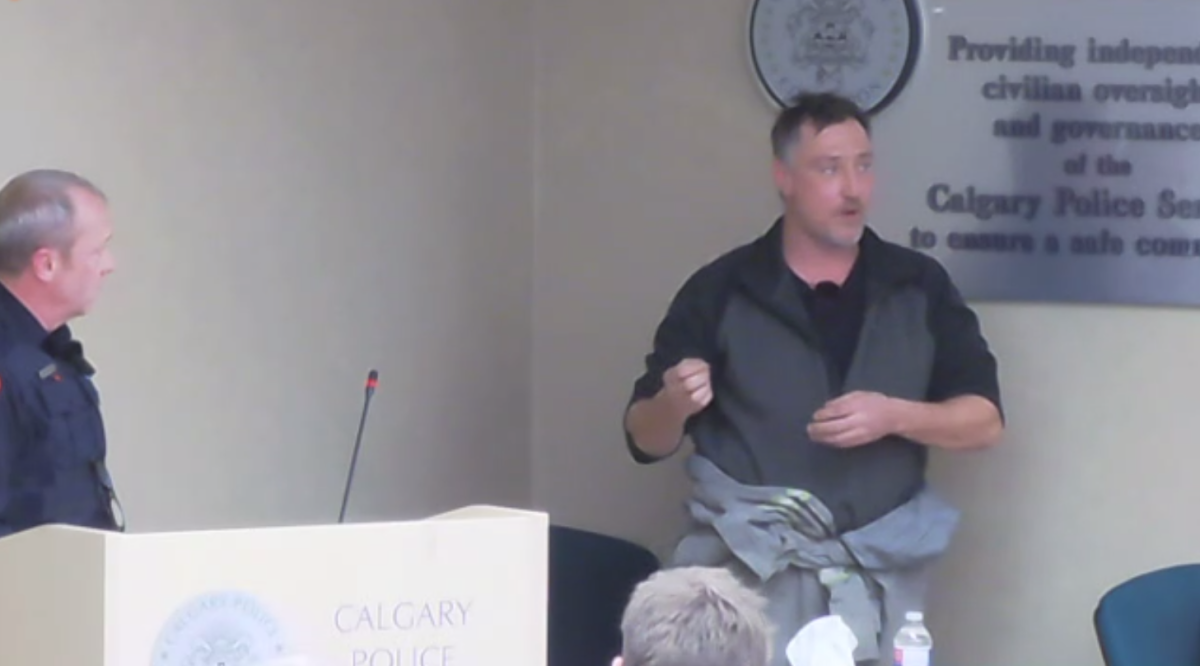Calgary’s civilian police oversight body got a unique insight on Wednesday into an aspect of the justice system that is seeing success with people facing drug- and addiction-related charges.

Eric Flinton took the lectern Wednesday afternoon to speak to the Calgary Police Commission.
“My intention for drug court was to get out and just go on the run again,” Flinton said.
“Somewhere in that time, the seven, eight months I was in jail, I thought about what I could do with myself and what drug court would do for me — so I gave it a shot.”
READ MORE: ‘Court of Hope’ helps turn around the lives of addicts
Flinton is one of the many success stories to come out of Calgary Drug Treatment Court, which celebrated its 15th anniversary this year.
Applications have to come through the candidates’ defence lawyer – often legal-aid lawyers – and applicants have to plead guilty to all charges, putting them on bail orders. A sentence is handed down and the drug court services, which include counselling and a probation, are then activated.
Anyone with strong gang ties or a “significant” pattern of violence is not accepted.

“I’m taking a risk from a public safety standpoint with different offenders saying that we’re vouching for them,” said Sgt. Mark Schwartz, the officer who vouched for Flinton’s candidacy in the program. “We put a lot of work into that and we don’t take everybody.
“We took a bit of a chance on him at that time, and I’m glad we did.

Get daily National news
“It was my intention today to tell you Eric’s story originally as part of this presentation, but the suggestion was made that I bring Eric to tell you his own story and if it was a great idea.”
Flinton told the commission his childhood was a near-constant rotation including group homes, foster homes, “special schools” and later jail and gang life.
“I finally hit my bottom when I got into meth and needles, and racked up a bunch of charges, (and then) went to jail,” he said.
“At one time I had no respect for law. But as someone that’s been changed, you guys go through a lot.
“Drug court has changed my way of thinking, has changed my way of life. Now I don’t need drugs to deal with pain.
“They have taught me through their 12-step program – which drug court has on its own, plus the Calgary Dream Centre’s – that forgiving myself was a big thing. Can’t forgive others if you can’t forgive yourself. And I forgave myself.”

Schwartz said there has been increased awareness in the judicial system of the need and efficacy of the program.
He also said there has been a “huge influx of support” from the provincial government, with new drug courts opening in municipalities like Medicine Hat, Lethbridge, Red Deer and Fort McMurray. Grande Prairie is expected to start a similar program soon.
“We do have a capacity based on funding. We’re not at capacity right now. We’d love to be,” the CPS officer said, noting ongoing awareness campaigns in multiple areas of the justice system.
Chief Mark Neufeld, a supporter of “therapeutic courts” like drug courts or Indigenous courts, said Eric’s story is not a unique one.
- Man charged after over 100 human skeletal remains found in Pennsylvania home
- Swiss prosecutors order detention of ski bar owner in deadly blaze probe
- New charges against man with al-Qaida ties as lawyer raises mental health concerns
- Man appealing human smuggling convictions can represent himself: U.S. judge
“But as Sgt. Schwartz pointed out, there is a fairly robust selection process for individuals going into that level of support,” the police chief said. “We want to make sure that we’re setting people up for success and that the resources are there to support them as they go through.
“Certainly in the future, we would like to see more people and more capacity there. But again, it’s not as easy as just, ‘Everybody can go.’ It’s got to be the right person at the right time.”
Flinton speculated he would be dead without the intervention services from the drug courts. He now says he’s employed, a contributing member of society and has respect for the law.
He’s been able to try to make amends with his family, who he recognized that he hurt.

“My sister is the only regret I have. I was in recovery and she died,” Flinton said while fighting back tears. “So I didn’t get to make amends on that one.”
Flinton successfully graduated from the drug treatment program and is serving his one-year probation as a “reward” for his success within the drug treatment court, Schwartz said.
Flinton is now an advocate for drug treatment court.
“I’ve told all my friends about it and I hope they take it, because sitting in a jail cell doesn’t help,” he said. “I wish I knew about drug court before, but I don’t think it would have helped because I wasn’t ready.
“I have been clean 996 days… I have my daughter back in my life. I now have friends.”








Comments